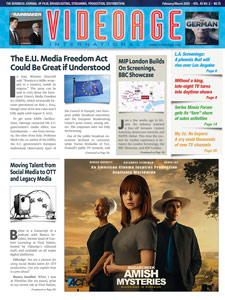By Steven Lowe*
Current “idea theft” and copyright laws provide different methods of protection for reality television concepts. However, there are some measures to be taken in order to be afforded those protections. U.S. federal copyright law protects any original works of authorship fixed in any tangible medium of expression. However, the Copyright Act only protects expression; ideas themselves are not protected.
The first step towards protecting reality TV concepts under copyright law is to express it through a tangible medium such as a treatment, a “sizzle reel,” or a screenplay. Once an idea has been expressed, the creator owns it.
The next step is to register the material with the United States Copyright Office, not the Writers Guild of America (WGA). There are two reasons not to register with the WGA. First, creators get none of the protections, rights, or benefits that creators get by registering with the Copyright Office. Second, the WGA destroys the work after five years, while the Copyright Office keeps it forever. Registering can be done online. It costs $55 (if not expedited). While creators already have ownership as soon as they express their ideas in a tangible medium, registering them with the Copyright Office has the benefit of establishing a public record of their copyright claim. Moreover, registration establishes evidence of the validity of the copyright and makes it possible for them to recover statutory damages and attorney’s fees.
When expressing an idea in a fixed tangible medium, it’s better to be more detailed. At least one federal court has found copyright infringement of a reality television show concept: Dillon v. NBC (C.D. Cal. June 18, 2013). Other courts view treatments concerning reality TV shows to be largely conceptual because they essentially describe an idea instead of a story. Furthermore, these courts note that reality TV treatments usually articulate common ideas that are regularly used in television such as competitions, games, or the reality aspect of the show, and are therefore not sufficiently original. Thus, while reality TV concepts are entitled to copyright protection if sufficiently detailed, protection is more certain under “idea theft” law.
The most prominently used method of Idea Protection is a claim of an implied-in-fact contract. Implied-in-fact contracts are contracts that a court will infer to have been created between two parties due to the facts and conduct of the parties.
To have an implied contract claim, a creator must have submitted ideas under circumstances whereby it is implied that compensation would be forthcoming if the ideas are used. An invited or “solicited” submission always meets those criteria. But be warned: Do not under any circumstances sign a “submission agreement” as the creator will be waiving his “idea theft” claim. And be sure to keep records of all communications/submissions; these records are evidence.
Generally speaking, to protect a reality TV concept, creators should either submit materials through an agent or manager with whom the company regularly does business, or obtain permission or an invitation to submit the work. If creators are able to show such circumstances, then a court will likely find an implied-in-fact contract that will entitle creators to be compensated for the use of their ideas.
*Steven Lowe is Senior Attorney at Lowe and Associates of Beverly Hills, California. He’s also President of the California Society of Entertainment Lawyers, an organization of attorneys who advocate for the rights of artists and creative professionals.












Leave A Comment